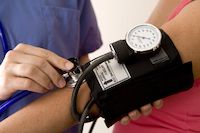Article
Resting Heart Rate Can Vary From Patient to Patient
Author(s):
New study using data obtained through wearables found resting heart rate can vary by up to 70 beats per minute from patient to patient.

The average resting heart rate of Americans can vary as much as 70 beats per minute, according to a recent study from the Scripps Research Translational Institute in La Jolla, CA.
Results of the study, which examined heart rates through use of wearables in more than 90,000 patients, found resting heart rate ranged from 39.7 to 108.6 beats per minute (BPM) and some patients experienced fluctuations of at least 10 BPM or more.
In an attempt to build upon previous research on the topic, investigators conducted a retrospective analysis of data from patients wearing Fitbit devices. Examining a time frame between March 2016 and February 2018, investigators obtained a total of 65,153,836 daily resting heart rate measurements.
For the purpose of the retrospective, observational cohort study, investigators excluded patients less than 18 years old or more than 100 years old, those who did not report either sex, and those with a BMI outside of a range between 15 and 50 kg/m2. Additionally, other inclusion criteria required patients to have worn the device for at least 2 days per week for 35 weeks and at least 20 hours per day—specific Fitbit devices included in the analyses included the Charge HR version 1-3, the Blaze, Alta HR, Ionic, Surge, and the Versa.
After application of the inclusion criteria, investigators were left with a final analysis population of 92,457 de-identified individuals—from this group, a total of 32,741,021 daily resting heart rate values were obtained. The mean age of the study cohort was 45.8±14.4 years, 63% were women, the average BMI was 28.4±5.8 kg/m2, and average sleep duration was 6.8±0.8 hours per day.
Upon analysis, the mean resting heart rate observed among study participants across all monitored days was 65.5±7.7 BPM—the lowest resting heart rate observed was 39.7 bpm while the maximum resting heart rate observed was 108.6 bpm. Among men, 95% had a resting heart rate between 50 and 80 bpm, which was lower than the 53 to 82 bpm range seen among women.
Investigators noted a U-shaped relationship when examining resting heart rate and weight. The lowest resting heart rate was associated with a BMI of 21 for women and 23 for men. Time of year also appeared to play a role in resting heart rate. Resting heart rate peaked during the first week of January in both men and women and decreased to the yearly minimum at the end of July.
Results indicated average resting heart rate increased as age increased until the age of 50 when resting heart rate began to decline. Sleep duration also appeared to be associated with resting heart rate as the minimum resting heart rate registered for both sexes occurred in individuals who slept an average of 7-7.5 hours per night. Investigators point out differences in resting heart rate as a function of age, BMI, and sleep duration were all statistically significant (P <.001).
About 20% of the individuals included in the study experienced median weekly fluctuations in resting heart rate of 10 or more BPM. Among the other 80%, the average fluctuation in resting heart rate in a single week was 3 BPM.
This study, “Inter- and intraindividual variability in daily resting heart rate and its associations with age, sex, sleep, BMI, and time of year: Retrospective, longitudinal cohort study of 92,457 adults,” was published online in PLOS ONE.





